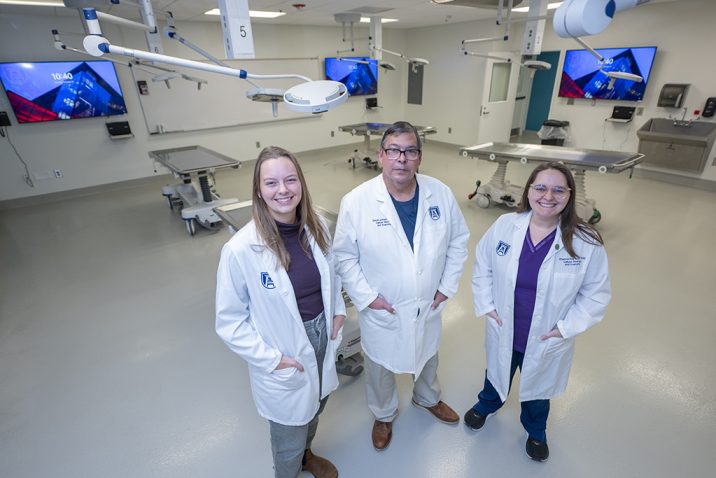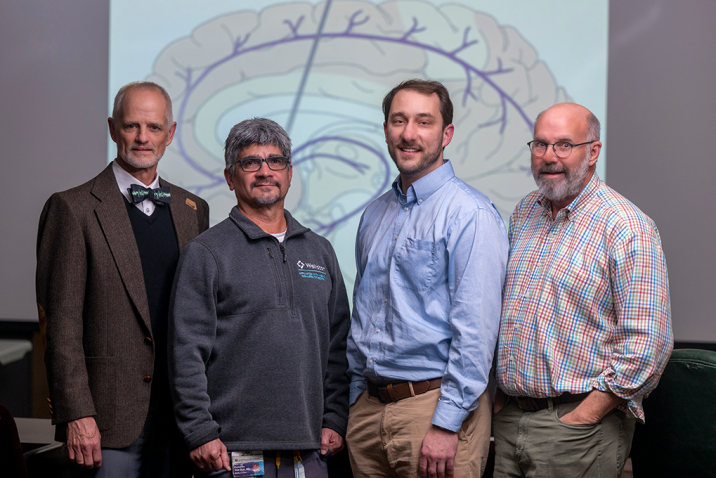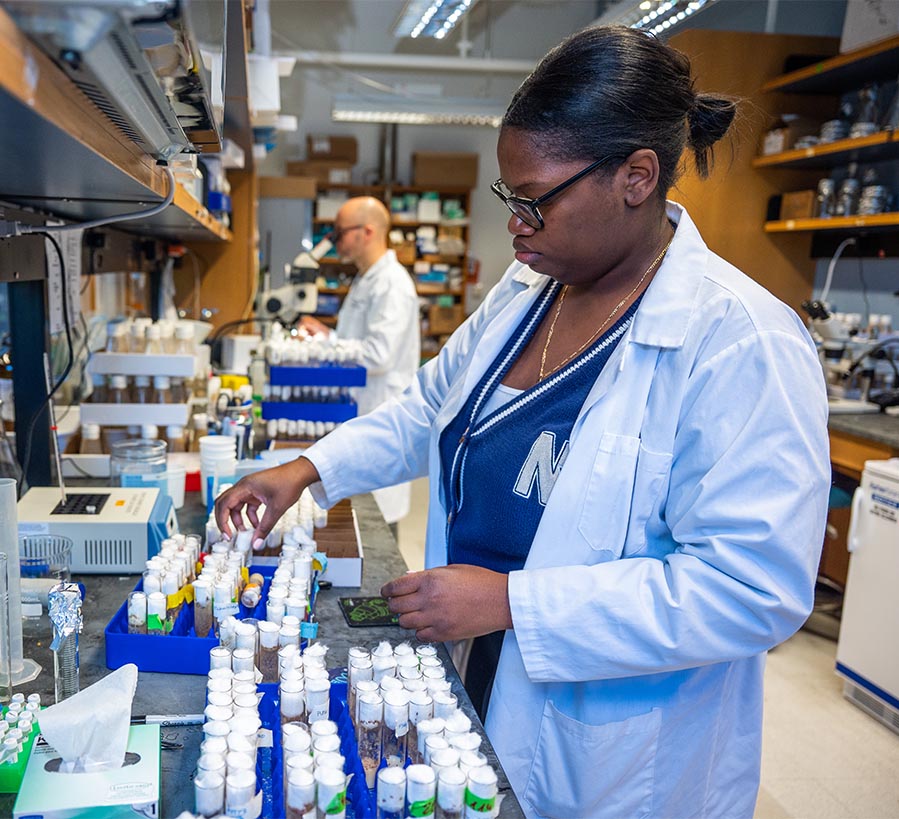Pharmacology
With a PhD in Pharmacology, your passion for biology translates into real-world application by identifying targets, drugs, and off-target toxicities that can improve human health and combat disease. We'll guide you to uncover the mysteries of disease, such as how a healthy system devolves through conditions of aging, neurotoxin/alcohol exposure, hemorrhagic injury, cardiovascular/pulmonary disease, and cognitive function/decline.
Alongside renowned faculty, you'll explore the cutting-edge of pharmacology with molecular targets research that includes G protein/cAMP signaling, circadian clocks, lnRNA, and transcription factors that are then applied in cell, mouse, and primate systems. Areas of focus include the subcellular location of drug targets, receptor binding events, and gene- and immunotherapy.
By choosing to earn your doctorate in Pharmacology from the Medical College of Georgia at Augusta University, you’ll be part of Georgia’s only public medical school located at the heart of the university’s research enterprise.
Pharmacology is for you if you consider yourself
Life-Changing
Life-Saving
Education
Want to learn more about the Pharmacology program at Augusta University?
Request InfoWhat You'll Study
Coursework
Students are admitted via a common admissions process to the Biomedical Sciences PhD programs. After completing the first-year common core coursework and laboratory rotations, students choose a dissertation research mentor and enter the Pharmacology program. Courses of study are designed to meet the needs of individual students as applied to the pharmacologic discipline.
The average time to complete the degree is approximately five years of full-time, year-round study.
Curriculum | Admissions Criteria | Tuition and Fees | Application Deadlines



EXPLORE. EXCEL. EXPAND.
Graduate School Advantage
Augusta University's graduate programs are among the best in the nation – and the world – and our graduate students are our most valuable assets. To ensure that our students earn more than a degree, the Graduate School offers a range of opportunities so they can develop the leadership, communication and personal skills needed for a rewarding life and academic, research or professional career.
See what the Graduate School has to offer »
About the Graduate SchoolExperience-based Education
Outside the Classroom
Graduate Research Day provides students with an excellent opportunity to show off their research in a supportive and inquisitive environment.
The Three-Minute Thesis Competition challenges graduate students to effectively explain their research in three minutes to a non-specialist audience.
The Biomedical Student Association is a student organization representing graduate students of the Biomedical Sciences that focuses on strengthening social networks within the graduate student community.
Successful Students
Over 95 percent of program graduates are placed in competitive academic, teaching, regulatory or industrial fields.
State-of-the-Art Facilities
The Health Sciences Campus at Augusta University is home to top-tier research labs and biomedical facilities.
Financial Assistance
Biomedical doctoral students can be awarded financial support in two categories: Graduate Research Assistantships and Graduate Research Teaching Assistantships.
Recognized Faculty
Internationally recognized faculty and researchers are committed to providing a superior learning environment for their students.
Your Future
Career Options
Graduates of the program have gone on to build careers in academia, pharmaceutical and biotechnology industries, and the private sector.
According to the U.S. Bureau of Labor Statistics, the median pay for a medical scientist is $100,890 per year. Job growth is projected to rise much faster than the average.
Profiles
Student Stories
Augusta University is a very collaborative environment, and I know that I can easily ask any professor or fellow student a question and get a positive response. Additionally, my work gives me the opportunity to feel like I can make a real positive change in the world.
Noah Watson
Everyone will tell you that picking your mentor is the most important decision you will make. I want to expand and add that it is equally important to pick a supportive department. An extended support network can be a huge boost to your resilience and success.
Khadijah Alexander
Admissions Criteria at a Glance
GPA: Overall GPA of 3.0 on a 4.0 scale at the Baccalaureate level calculated on all undergraduate work.
Degree Requirement: Minimum of a Bachelor’s degree or equivalent from an accredited college or university.
Transcripts: Official transcripts are required from all universities and colleges ever attended. Unofficial transcripts from US colleges and universities can be used in the admissions review process in lieu of official transcripts for this program.
Standardized Test Requirements: None are required for this program.
Letters of Recommendation: Recommendations from three individuals must be submitted through the application portal.
Resume: Applicants must submit a resume or curriculum vitae within the application portal.
Research Experience: Research experience is required for admission. Within the application, you will be prompted to provide both personal and research statements. Please consult the application for the full statement prompts.
International Students: Please review the verification process for international transcripts and the english proficiency requirement.
Tuition & Fees Estimate
$4,801*
Estimated total
Full-time / In-State / Per Semester
$401
Tuition Per Hour
$675
Mandatory Fees
View Detailed Program Tuition
*Tuition & Fees listed here are for in-state students enrolling in the university for Fall 2024 semester.
Detailed Program Tuition InformationApplication Deadlines
Fall '26 International Deadline**
- December 1, 2025
Fall '26 Deadline
- December 1, 2025 - extended to December 15, 2025
Early submission of all application materials is strongly advised.
All required application materials and documents must be received in order for an application to be considered complete and before an admission decision can be made. The program does not accept applications after the published application deadline, however the program will continue to accept application materials up to 2 weeks after the application deadline.

Why Augusta?
The dedicated faculty is made up of internationally recognized researchers who are at the top of their various fields.
The collaborative environment allows you to maximize your learning opportunities and research acumen.
Extracurricular activities provide excellent networking opportunities that enhance your career objectives.

Families leave lasting contribution to medical science with body donations
Families leave lasting contribution to medical science with body donations
MCG starts human trials on deep brain stimulation for Alzheimer’s patients
MCG starts human trials on deep brain stimulation for Alzheimer’s patients

